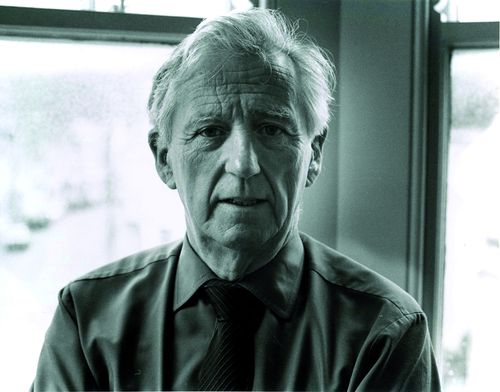Emyr Humphreys – 100 in 2019
“For over fifty years, Emyr Humphreys has been the supreme chronicler of ‘Welsh Time.’ His has been a unique cultural achievement European both in quality and importance.” – M. Wynn Thomas
“Chief interpreter of Welsh life” – R. S Thomas

It is difficult to think of another literary figure who has contributed more to the two literatures of Wales than Emyr Humphreys. He has published some two dozen works of fiction, plays and scripts for television, poetry collections, seminal essays as well as a visionary cultural history of Wales. This achievement is indeed remarkable, to have sustained a remarkable career spanning over seventy years as a writer.
To mark the centenary of his birth in 2019, Wales PEN Cymru wish to establish an award in his name, by celebrating his achievement with a Wales PEN Cymru award for writing in both English and Welsh.
The award will be given to the most daring and innovative writing about Wales published during 2019 in any form: article, essay, blog, or any other written form. Members of Wales PEN Cymru will be invited to send in nominations of entries and at the end of November a short-list will be judged by three eminent adjudicators in both languages.
The prize awarded will be £1000 for the best Welsh entry and £1000 for the English entry with a prize giving ceremony to be held in Oriel Môn in January 2020.
Wales PEN Cymru are therefore seeking sponsorship for these awards as well as financial support to celebrate in Oriel Môn in January, 2020, in the region of £3000 for prize money and other administration and publicity costs. Donations can be made through the link below.
For more information, or should you want to sponsor this venture, please see below link or contact walespencymru@gmail.com
Menna Elfyn
President of Wales PEN Cymru
Further information
Emyr Humphreys, born in 1919 in Prestatyn, north Wales but settled in Llanfairpwll, Anglesey where he still lives close to his family. He is undoubtedly one of the foremost Welsh novelists writing in English. He is the author of over two dozen novels, short story collections, volumes in verse as well as non-fiction work, and was described by the poet R. S. Thomas as ‘the supreme interpreter of Welsh life’.
In the early 40’s, as a conscientious objector, and whilst studying history at the University of Wales, Aberystwyth, he was sent to work on the land during the Second World War. He subsequently went as a war relief worker to the Middle East and then to Italy, where he worked for Save the Children. In the mid-fifties, he joined BBC Wales as a drama producer, before taking a lectureship in Drama at the University of Wales, Bangor. In 1972, after remarkable success as a young novelist, winning the Somerset Maugham Award for Hear and Forgive (1952) and the Hawthornden Prize for A Toy Epic (1958), his most famous novel, written in both Welsh and English, he embarked on a career as a full-time writer.
His work, which has remained true throughout his career to the realist novel, is concerned with goodness, with social and political conscience. It has been described as reflecting the passionate concerns of the past century with freedom, autonomy and a post-imperial assertion of human rights, as exploring the impact of globalization on the way we communicate. And as written in the Times Literary Supplement, ‘just as the modernists doubted the ability of language to “say just what I mean”, so Humphreys recontextualizes the modernist preoccupation as a particularly pernicious aspect of materialism. Mass culture is an opiate, which the necessarily singular voice of the fiction writer must (in however beleaguered a manner) continue to oppose.’
In his volume of short stories, Old People are a Problem (Seren, 2003), he explores a variety of situations in which the young and the old are obliged to live together at the beginning of the 21st century. His most recent work is The Shop (Seren, 2005).In 2014 A Toy Epic was selected for the Schwob list of modern classic must-reads. The novel will be amongst titles pitched by Schwob to publishers across Europe likely to be interested in purchasing translation rights.
‘The sort of writer who would be in the running for a Nobel Prize if Wales had lobbyists in Stockholm.’ – The Observer.
